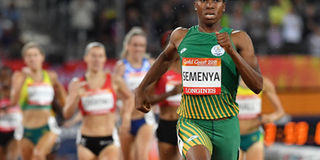IAAF discriminating Semenya

Decision Not In Good Taste. Semenya is currently fighting her case in Lausanne, Switzerland involving the IAAF and Athletics South Africa. Proposed IAAF regulations target female athletes with hyperandrogenism, suggesting that they take medication to reduce their naturally produced testosterone. AGENCIES PHOTO
What you need to know:
- The IAAF have probably seen worse as it no stranger to controversy. And like other powerful global sporting institutions they have a resource pool that makes them slippery.
South African Caster Semenya the double Olympic 800m champion is hyperandrog enous, meaning she has elevated testosterone levels, a condition that has cast a shadow over her athletics career ever since she won the world 800m title as an 18-year-old in 2009.
In plain English, the condition lends her a Difference of Sexual Development (DSD) which leaves her not only ‘looking’ but also ‘running’ like a man. The International Association of Athletics Federations (IAAF) is so concerned that it is recommending that if people like her want to continue taking part in international events, they should reduce their blood testosterone levels for a continuous period of at least six months and maintain those levels for the rest of their athletic careers or compete against men.
Semenya, who was this week present at the Court of Arbitration for Sports in Lausanne Switzerland to attend her hearing, has challenged and put on hold the execution of these sanctions for four months now. The court will pronounce itself at the end of March but for now Semenya and her team see the sanctions as no more than a scheme to penalize her for an innocuously natural, albeit physically empowering condition, but one in which she had no say.
In other words, she didn’t choose hyperandrogenism. It chose her.
On the other hand, the IAAF say its commendations are noble and necessary to ensure fair competition for all women because they have anticipated a risk of losing the next generation of female athletes, who see their path to success in sport blocked by those who identify as female but have testosterone levels in the male range.
Testosterone levels
The IAAF say that this is not to classify any DSD athletes as male but actually ends up doing just that by suggesting Semenya should drop her testosterone levels into the female range in order to compete at the elite level in the female classification or is welcome to line up with the likes of David Rudisha and Alfred Kipketer at the next event.
My take is whatever the resolution shall be, the IAAF should have known better than take this this path. There are some medical issues, social issues and sports issues here.
How does sport draw the line without triggering tremors whose aftershock will ripple beyond athletics or even sports in general?
The IAAF have probably seen worse as it no stranger to controversy. And like other powerful global sporting institutions they have a resource pool that makes them slippery.
But whichever way you look at this one, it doesn’t end well. It is just about to move from a case for fair competition to become a matter of gross violation of an individual’s rights in regard to their identity, sense of privacy, and ability to earn a livelihood.
It doesn’t help that it’s 2019, the individual in question is a woman or that the only events covered by the IAAF new rules are the ones Caster Semenya competed in.
Only the brave and foolish will disregard discrimination here.




